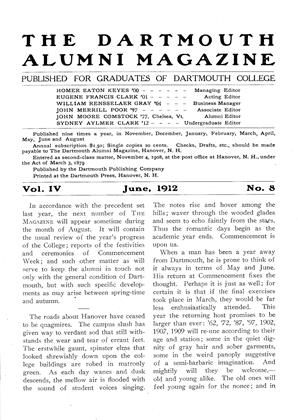HOW THE HEALTH OF THE COLLEGE IS MAINTAINED
June, 1912 Howard Nelson Kings ford, D. M. C. '98We are still of the same opinion as was stated in the 81-MONTHLY in 1900 that an ounce of preventiion is worth many pounds of cure, and we have endeavored to carry out this idea in every conceivable direction, and the results have been most gratifying.
Especially has this been true in preventing loss of time from college work by the students suffering from bronchitis and minor ailments such as colds. It was found by taking cultures of the air in recitation rooms and other halls that at times the air carried large numbers of bacteria and that some of these organisms were those usually found in colds. It was decided to disinfect these rooms whenever the number of organisms found growing on the culture plates was above 35, no account being taken of the varieties. The result has been remarkable as shown by the following figures:
1903-04 1906-07 1910-11 Head colds 65 21 18 Influenza 56 30 14 No. of men in College 850 1229
When we commenced this method some of the rooms required disinfecting every week, while now we very seldom have to disinfect oftener than once m six weeks and in many instances even longer periods are sufficient to keep the count down.
Another procedure which is found to be very practicable is used in cases when a student seems to be very susceptible to colds and has one after another. In these cases by keeping formalin in his room continually for a few days so that he inhales more or less of it at all times the organisms causing the trouble have been destroyed and the cases cured.
Many of us remember that in the old days when a case of measles, diphtheria, or scarlet, fever appeared in the College many other cases were sure to follow. Last spring one of the students returned from his vacation and developed a sore throat in a few days. Cultures from his throat showed diphtheria bacilli. The night before he called a physician he was present and took 'part in a house party at his fraternity and, of course, exposed the whole party. He was taken to the isolation hospital, the house disinfected, cultures were taken from all exposed and some were given immunizing doses of antitoxin and all were watched—caiefully for several days, with the result that not a single secondary case developed. Last fall there were over thirty cases of scarlet fever scattered about the town. Some of these had come in contact in various ways with the students, yet not a single case developed among the students. I mention these instances because there are still some who do not realize the importance of prompt isolation, inspection, and disinfection.
Many of us can also remember in the old days when it was great fun to setid the barrels of ashes and other material rolling down Dartmouth Hall stairs. Nothing like that goes on now. A man is employed by the College whose business it is to keep all rubbish 1 emoved promptly, as it was found that even in a pile of papers, bacteria could find moisture and food enough to develop in
large numbers. In the past it has been difficult for the medical director to get at all the cases of sickness in the College, .as many would not call a physician, and then again it very frequently happened that a man would be sick a number of days before the physician in attendance would get around to report the case to me. We are now able to get at cases of sickness promptly, as the janitor is obliged to report all cases to the Superintendent of Buildings at once, and if he fails to do this we get a new janitor. This has enabled the medical director to get hold of quite a number of cases which would not have had medical attendance because of financial reasons.
All the college buildings have been connected with a sewer for quite a number of years, but there have been parts of the town where sewer conveniences have not existed. This last fall 5,000 feet of new sewer pipe was laid and the area known as "the flat" is now well sewered, and this area which in the past has been more or less of an eyesore is now in a thoroughly sanitary condition.
This spring we are after the milk dealers who supply the College and clubs with milk. In order to improve the condition of the milk the College has very generously offered a prize of $25.00 to the dairyman who shows the greatest improvement along sanitary lines in his farm and especially in connection with the milk production. The prize is to be awarded May 1, 1913.
We are also after the flies. Strange as it may seem there are a few flies here, and a vigorous attempt is being made to destroy their breeding places.
In fact, at all times and in every way, we are trying to improve the sanitary surroundings of the College in order to reduce to a minimum the time lost from tollege work by the student on account of sickness.
Howard Nelson Kingsford, D. M. C. '98, Medical Directorof the College
 View Full Issue
View Full Issue
More From This Issue
-
 Article
ArticleIn accordance with the precedent set last year,
June 1912 -
 Article
ArticleSPRING MEETING OF TRUSTEES
June 1912 -
 Class Notes
Class NotesLOCAL ASSOCIATIONS
June 1912 -
 Article
ArticleTHE DARTMOUTH COLLEGE GRANT
June 1912 By Philip W. Ayres -
 Article
ArticleDARTMOUTH SOCIAL SERVICE
June 1912 -
 Article
ArticleTHE ENGLISH TEACHERS' CONFERENCE
June 1912 By Francis Lane Childs, '06








